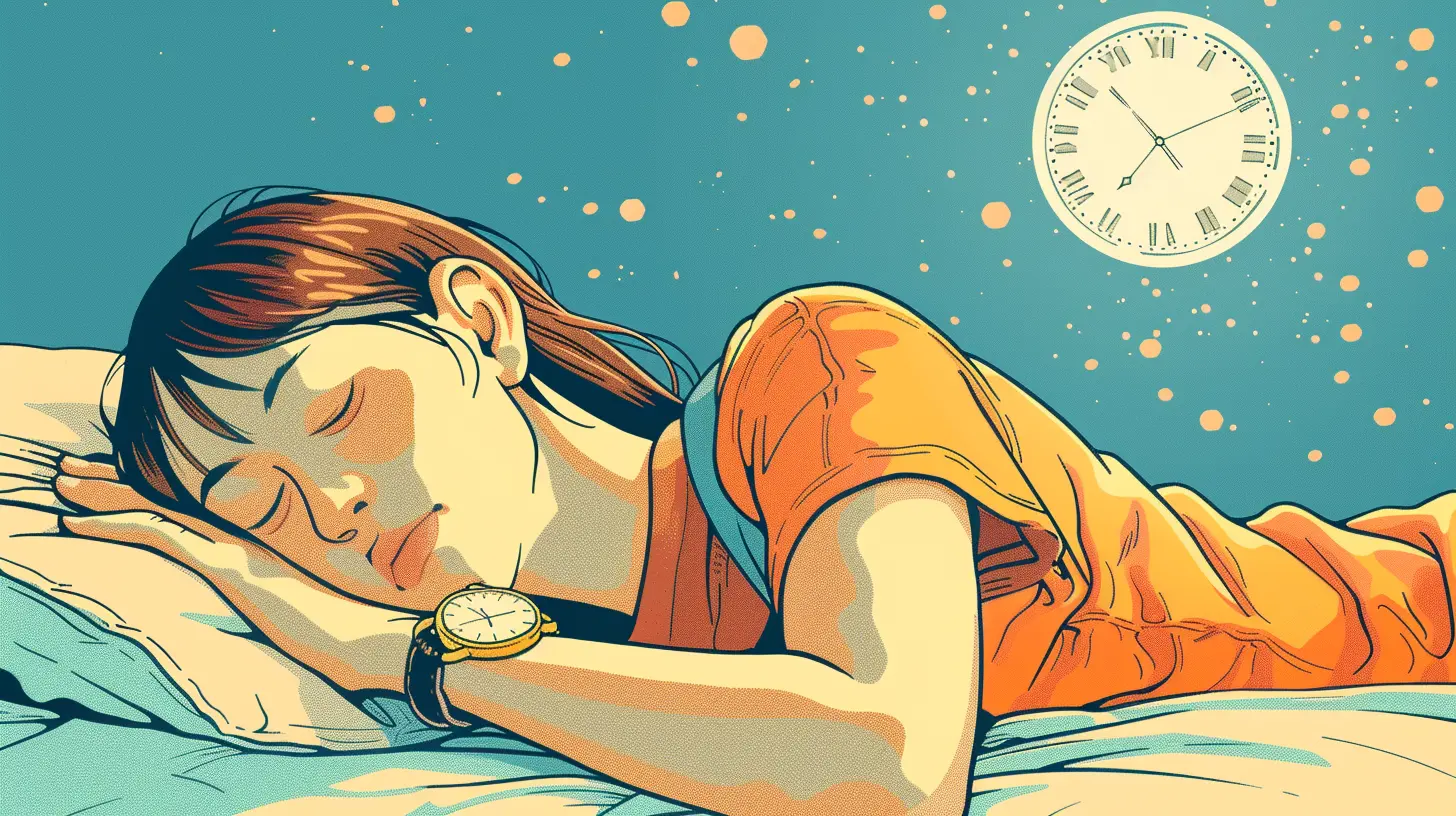The Psychology of Sleep: How Rest Affects Your Child’s Behavior
29 September 2025
Have you ever noticed how kids seem to turn into tiny tornadoes of chaos when they haven't had enough sleep? One minute they're calm, focused, and sweet, and the next, they're cranky, fidgety, and throwing tantrums over the smallest things. It’s not just a coincidence or bad luck. The truth is, sleep—or the lack thereof—has a massive impact on your child's behavior, mood, and overall psychological well-being.
In this article, we'll dive deep into the psychology of sleep and how it affects your child's behavior. We’ll explore the importance of sleep, the science behind it, and how to ensure your child gets enough. By the end, you’ll understand why sleep is just as crucial as food and exercise for your child’s development.

Why Sleep Is Essential for a Child’s Development
First things first, why is sleep so important? While we often think of sleep as “rest,” there’s a lot more going on than just closing your eyes and drifting off. Sleep is when the brain does some of its most important work, especially in children. It’s like hitting the reset button, allowing your child’s brain to process everything they’ve learned and experienced during the day.Sleep and Brain Development
Children's brains are like sponges, soaking up information at an astonishing rate. Sleep is critical for consolidating that information. During deep stages of sleep, the brain reinforces memories, which helps with learning and problem-solving. Think of it as your child’s brain filing away all the new experiences of the day, organizing them for future use.Without enough sleep, this filing system goes haywire. That means your child might struggle to remember what they learned in school, have trouble focusing, or even feel more emotional. In short, sleep isn’t just important for physical rest—it’s a key part of mental and emotional development.
Emotional Regulation
Ever noticed how your child seems to be more irritable or moody after a poor night's sleep? There’s a reason for that. Sleep directly affects the brain's emotional centers, particularly the amygdala, which is responsible for processing emotions like fear and anger.When a child is sleep-deprived, the amygdala becomes more reactive, making them more likely to experience mood swings, anxiety, or even aggressive behavior. On the other hand, when they’re well-rested, they’re better able to manage their emotions and respond calmly to stressful situations.
It’s like having a full battery—when your child is well-rested, they have more emotional “charge” to handle the ups and downs of the day. But when they’re running on empty, even the smallest frustrations can feel like the end of the world.

How Much Sleep Does Your Child Really Need?
So, how much sleep is enough? It depends on your child's age. As a general rule of thumb:- Infants (4-12 months): 12-16 hours per day (including naps)
- Toddlers (1-2 years): 11-14 hours per day (including naps)
- Preschoolers (3-5 years): 10-13 hours per day (including naps)
- School-aged children (6-12 years): 9-12 hours per day
- Teenagers (13-18 years): 8-10 hours per day
If your child isn’t hitting these numbers, they could be sleep-deprived, which can have a significant impact on their behavior and cognitive function.

The Link Between Sleep and Behavior in Children
Now that we know how much sleep children need, let’s get into the juicy part—how exactly does sleep (or the lack of it) affect their behavior?Increased Irritability and Tantrums
This one probably won’t surprise you. When kids don’t get enough sleep, they become cranky. Their tolerance for frustration decreases, and they’re more likely to have meltdowns over seemingly minor issues. Imagine how you feel when you’ve had a bad night’s sleep—everything seems harder, right? Now multiply that by ten for a child whose brain is still developing.Sleep deprivation makes it harder for kids to regulate their emotions, leading to more tantrums, mood swings, and general irritability. Basically, sleep is the key to keeping those temper tantrums at bay.
Hyperactivity and Inattention
Here’s a twist you might not expect: lack of sleep doesn’t always make kids sluggish. In fact, it can make them hyperactive. This is especially true for younger children. When kids are exhausted, they sometimes “power through” by becoming more active. It’s like their bodies go into overdrive, trying to stay awake.This can make them seem restless, fidgety, and even impulsive. If your child is struggling to sit still in class or constantly bouncing off the walls, poor sleep could be to blame. In some cases, chronic sleep deprivation can even be mistaken for ADHD because the symptoms—hyperactivity, impulsiveness, and inattention—are so similar.
Impaired Learning and Memory
Remember how we talked about sleep being essential for brain development? Well, one of the most immediate impacts of poor sleep is on learning and memory. When children don’t get enough sleep, they have a harder time focusing in school, remembering what they’ve learned, and solving problems.This isn’t just about academics, either. Sleep-deprived kids may also struggle with everyday tasks, like following instructions or solving simple problems. In other words, sleep is crucial for both school success and overall cognitive development.
Social and Behavioral Issues
Sleep deprivation doesn’t just affect how kids feel—it also impacts how they interact with others. Kids who are tired are more likely to act out, be defiant, or have trouble getting along with peers. They might struggle to take turns, share, or follow the rules during playtime.Over time, this can affect their social development. If your child is frequently in trouble at school or having a hard time making friends, it might be worth taking a closer look at their sleep habits.

The Science Behind Sleep: Understanding Sleep Cycles
Let’s get a bit more technical for a moment. To truly understand how sleep affects your child’s behavior, you need to know about sleep cycles. Sleep isn’t a single, continuous state. Instead, it’s made up of several stages, each with its own purpose.The Stages of Sleep
1. Non-REM Sleep: This is the first stage of sleep, which is broken into three phases. It starts with light sleep and progresses to deep sleep. Deep sleep is the most restorative phase, where the body repairs itself and the brain consolidates memories.2. REM Sleep: This is the dream phase of sleep. REM stands for “rapid eye movement,” and it’s during this stage that the brain is highly active, processing emotions and experiences. REM sleep is crucial for emotional regulation and cognitive function.
A full sleep cycle lasts about 90 minutes, and most kids will go through four to six cycles in a night. If their sleep is interrupted, they may not get enough deep or REM sleep, which can lead to the behavioral issues we’ve been discussing.
Sleep Disorders to Watch Out For
Sometimes, sleep issues aren’t just about getting to bed late. Your child might have an underlying sleep disorder, such as:- Sleep Apnea: This is when breathing is interrupted during sleep, causing poor-quality rest.
- Restless Leg Syndrome: This causes children to feel an uncontrollable urge to move their legs, disrupting their sleep.
- Insomnia: Some kids have trouble falling or staying asleep, often due to anxiety, stress, or an irregular sleep schedule.
If you suspect a sleep disorder, it’s worth talking to your pediatrician. Treating the underlying issue can make a world of difference in your child’s behavior.
How to Improve Your Child’s Sleep Quality
Now that we’ve covered how vital sleep is and how it affects your child’s behavior, you’re probably wondering how to ensure your child gets enough of it. Here are some tips to improve your child’s sleep quality:Establish a Consistent Bedtime Routine
Kids thrive on routine. Creating a consistent bedtime routine signals to your child’s brain that it’s time to wind down. This could include activities like reading a book, taking a warm bath, or listening to calming music. The key is to keep things predictable.Set a Regular Sleep Schedule
Try to keep bedtime and wake-up time the same every day, even on weekends. This helps regulate your child’s internal clock, making it easier for them to fall asleep and wake up at the right times.Limit Screen Time Before Bed
The blue light from screens can interfere with the production of melatonin, the hormone that helps regulate sleep. Try to limit screen time at least an hour before bed. Instead, opt for calming activities like reading or storytelling.Create a Sleep-Friendly Environment
Make sure your child’s bedroom is conducive to sleep. This means keeping it cool, dark, and quiet. If your child is afraid of the dark, a small nightlight can help, but avoid bright lights that may interfere with sleep.Encourage Physical Activity During the Day
Physical activity can help tire your child out, making it easier for them to fall asleep at night. Just make sure they’re not too active right before bed, as that can have the opposite effect.
Final Thoughts
Sleep and behavior are deeply intertwined, especially for children. When your child gets enough rest, they’re better equipped to handle their emotions, focus on learning, and get along with others. On the flip side, when they’re sleep-deprived, everything seems harder—for them and for you.By understanding the psychology of sleep and making a few simple changes to your child’s sleep routine, you can set them up for success—both in terms of their behavior and their overall well-being. So, next time your child is having an off day, ask yourself: Did they get enough sleep last night?
all images in this post were generated using AI tools
Category:
ParentingAuthor:

Paulina Sanders
Discussion
rate this article
1 comments
Cambria Valentine
Great insights on the importance of sleep in shaping children's behavior! Understanding the connection between rest and mental well-being is crucial for parents. Your tips are not only practical but also empowering. Thank you for shedding light on this vital topic—helping both kids and parents thrive through better sleep!
October 23, 2025 at 2:40 AM

Paulina Sanders
Thank you for your kind words! I'm glad you found the insights helpful. Supporting children's sleep is indeed essential for their behavior and overall well-being.


